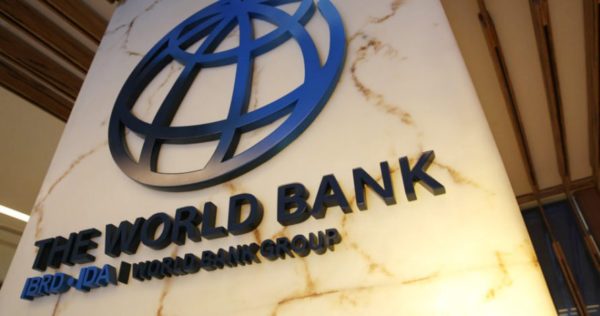
Economic Reforms Boost Nigeria’s Revenue to N12trn – World Bank
The Federal Government’s revenue rose by 82.4 per cent from N6.8tn in 2023 to N12.4tn in 2024, driven by the unification of the foreign exchange rates, enhanced tax administration, and reforms in treasury remittances, the World Bank has said.
The development represents a N5.6tn increase in federally collected revenue and a significant rise in the government’s revenue-to-GDP ratio from 2.9 per cent in 2023 to 4.5 per cent in 2024.
The World Bank disclosed this in its latest Nigeria Development Update report, titled “Building Momentum for Inclusive Growth” in Abuja. The Bretton Woods institution attributed the revenue growth to three major fiscal reforms carried out by the Nigerian government in the last two years.
It, however, noted that revenues remain low, limiting the government’s ability to fund development spending despite improvements in public financial management
“Gains from FX unification and improved revenue administration boosted FGN’s revenues. Revenues increased sharply from N6.8tn (2.9 per cent of GDP) in 2023 to N12.4tn (4.5 per cent of GDP) in 2024,” the report said.
Gains from FX unification and improved revenue administration boosted FGN’s revenues. Revenues increased sharply from N6.8tn (2.9 per cent of GDP) in 2023 to N12.4tn (4.5 per cent of GDP) in 2024, due to three factors.
According to the report, the unification of the official and parallel exchange rates significantly increased government revenue from oil, customs duties, and other FX-linked sources. Previously, such inflows were remitted to the Federation Account at the official rate, which was around 53 per cent lower than the market rate in 2022.
This disparity, the bank said, had led to large revenue losses before the reform.
The second driver of growth, the report noted, was enhanced tax administration. Specifically, the deployment of the TaxPro Max platform by the Federal Inland Revenue Service and the implementation of withholding VAT at source by targeted sectors led to a sharp increase in non-oil revenue.
It said the third key factor was the reform of revenue remittances from Ministries, Departments, and Agencies, as well as Government-Owned Enterprises. The policy, introduced in December 2023, standardised and automated transfers of independent revenues to the treasury.
This contributed an additional 0.8 percentage points to Nigeria’s revenue-to-GDP ratio in 2024, the World Bank noted.
“First, the unification of the FX rate led to a significant revenue windfall, as various FX- denominated revenues (oil, VAT, CIT, and customs) used to be transferred to the Federation at the official rate, which was 53 per cent lower than the parallel rate in 2022, causing large forgone revenues of N6.2tn.
“Second, enhanced tax administration, including digital tax collection via the TaxProMax system and the implementation of withholding VAT at source by certain sectors, also helped boost revenues as evidenced by the 86.1 per cent increase in locally collected VAT in 2024.
“Third, FGN’s independent revenues increased by 0.8 percentage points of GDP in 2024, following the December 2023 reform that standardised and automated remittances from MDAs and GOEs to the treasury,” the World Bank stated.
Similarly, the Bretton Woods institution said Nigeria could boost its customs revenue by 66 per cent if the government eliminates arbitrary tariff deviations and import bans.
It warned that current trade policies distort prices, petrol smuggling, and weaken customs enforcement, ultimately costing the country billions in lost revenue.
The report also linked the tariff policy to lost government revenue, noting that high tariffs and import bans contribute to evasion and reduce customs collections. The World Bank noted that the deviations push consumer prices up, encourage smuggling, and weaken customs enforcement.
“Lifting them could increase current customs revenues by 66 per cent, contributing to the ongoing fiscal adjustment,” the report said. “The government should consider seizing the opportunity created by the market-reflective, competitive exchange rate to reorient trade policy for growth and jobs.
“Nigeria maintains higher-than-average tariffs on many products, bans the imports of others, and imposes many non-tariff barriers. The average tariff rate in the country is twice as high as the sub-Saharan average.”
The Bretton Woods institution said that with the naira now more competitive, domestic producers are better positioned to compete with imports and take advantage of export markets.
“To produce more and export more competitively, Nigerian firms also need to import, including intermediate goods and services,” the report added.
The bank advised the federal government to align tariffs with the ECOWAS CET and start with food items, given their direct impact on household welfare.
CET is a system where all member countries of ECOWAS apply the same customs duties, import quotas, and preferences to goods entering the region from third countries
The World Bank warned that current trade restrictions are disproportionately hurting poorer Nigerians.
“Reducing tariffs and import bans would confer direct benefits to consumers, giving them access to more products at lower prices, lowering inflationary pressure, boosting their purchasing power, and offering relief in the context of high cost-of-living pressures,” the report said.
“Import bans increase prices by an estimated 5.8 per cent on average in Nigeria, particularly for products more intensely consumed by poorer households, such as food and medical products. Lifting import bans could lower poverty rates by an estimated 2.6 percentage points.”
The World Bank recommendation comes more than a month after the United States Trade Representative faulted Nigeria’s import ban on 25 items, saying the restrictions limit market access for American exporters.
